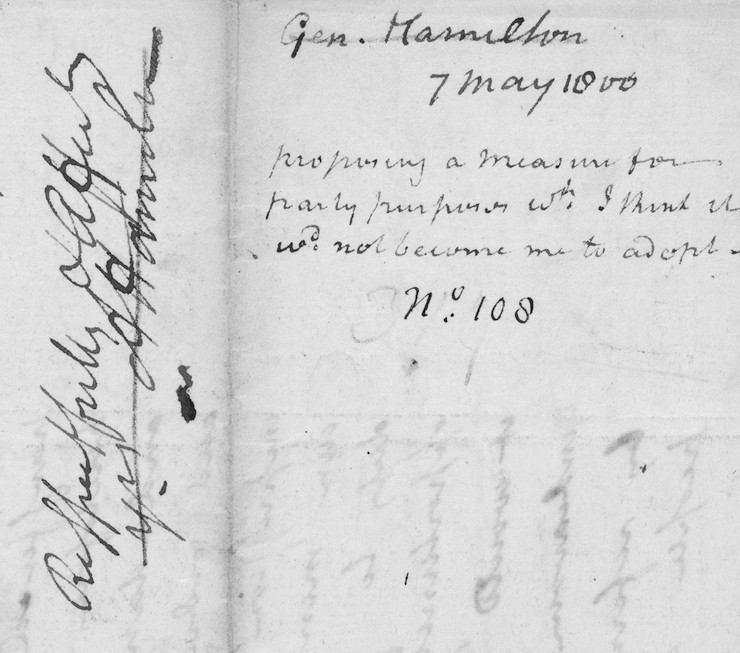To John Jay from Alexander Hamilton, 7 May 1800
From Alexander Hamilton
New York May 7. 1800
Dear Sir,
You have been informed of the loss of our Election in this City. It is also known that we have been unfortunate throughout Long Island & in West Chester— According to the Returns hitherto, it is too probable that we lose our Senators for this District.1
The moral certainty therefore is that there will be an Antifœderal Majority in the Ensuing Legislature, and the very high probability is that this will bring Jefferson into the Chief Majistracy; unless it be prevented by the measure which I shall now submit to your consideration, namely the immediate calling together of the existing Legislature.
I am aware that there are weighty objections to the measure; but the reasons for it appear to me to outweigh the objections. And in times like those ^in^ which we live, it will not do to be overscrupulous. It is easy to sacrifice the substantial interests of Society by a strict adherence to ordinary rules.
In observing this, I shall not be supposed to mean that any thing ought to be done which integrity will forbid—but merely that the scruples of delicacy and propriety, as relative to a common course of things, ought to yield to the extraordinary nature of the crisis. They ought not to hinder the taking of a legal and constitutional step; to prevent an Atheist in Religion and a Fanatic in politics from getting possession of the helm of the State.
You Sir know in a great degree the Antifœderal party, but I fear that you do not know them as well as I do— Tis a composition indeed of very incongruous materials but all tending to mischief— some of them to the overthrow of the Government by stripping it of its due energies others of them to a Revolution after the manner of Buonaparte. I speak from indubitable facts, not from conjectures & inferences.

Detail of letter from Alexander Hamilton, 7 May 1800, featuring John Jay’s telling endorsement. (John Jay Papers, Rare Book & Manuscript Library, Columbia University in the City of New York)
In proportion as the true character of the party is understood, is the force of the considerations which urge to every effort to disappoint it. And it seems to me that there is a very solemn obligation to employ the means in our power.
The calling of the Legislature will have for object the choosing of Electors by the people in Districts. This (as Pensylvania will do nothing) will insure a Majority of votes in the U[nited] States for Fœderal Candidates.2
The measure will not fail to be approved by all the Federal Party; while it will no doubt be condemned by the opposite. As to its intrinsic nature it is justified by unequivocal reasons of public safety.
The reasonable part of the world will I believe approve it. They will see it as a proceeding out of the common course but warranted by the particular nature of the Crisis and the great cause of social order.
If done the motive ought to be frankly avowed. In your communication to the Legislature they ought to be told that Temporary circumstances had rendered it probable that without their interposition the executive authority of the General Government would be transfered to hands hostile to the system heretofore pursued with so much success and dangerous to the peace happiness and order of the Country— that under this impression from facts convincing to your own mind you had thought it your duty to give the existing Legislature an opportunity of deliberating whether it would not be proper to interpose and endeavour to prevent so great an evil by referring the choice of Electors to the people distributed into Districts.
In weighing this suggestion you will doubtless bear in mind that Popular Governments must certainly be overturned & while they endure ^prove^ engines of mischief— if one party will call to its aid all the resources which Vice can give and if the other, however pressing the emergency, confines itself within all the ordinary forms of delicacy and decorum.
The legislature can be brought together in three weeks— So that there will be full time for the object; but none ought to be lost—
Think well my Dear Sir, of this proposition. Appreciate the extreme danger of the Crisis; and I am unusually mistaken in my view of the matter, if you do not see it right and expedient to adopt the measure.3 Respectfully & Affectly Yrs.
A Hamilton
Governor Jay
ALS, NNC (EJ: 05635). Endorsed: “Gen. Hamilton / 7 May 1800 / proposing a measure for / party purposes wh I think it / wd. not become me to adopt—”. WJ, 1: 412–14; HPJ, 4: 270–72; PAH, 24: 464–67. JJ’s reply not located, although he noted his response to AH’s proposal in the letter’s endorsement.
1. For the outcomes of legislative races in New York City and the Southern District, see the editorial note “Republican Ascendancy in 1800,” and note 7, above.
2. Following a poor turnout for JA in Pennsylvania during the 1796 presidential election, Federalist members of the state senate attempted to introduce district voting as a new system for selecting presidential electors for the 1800 contest. Their efforts were blocked, however, by Republicans in the lower house who favored a general election. As a result, Pennsylvania was without an electoral law until a new legislative session reached a compromise in November 1800. See PAH, 24: 450.
3. For more on AH’s proposal to adopt a method of selecting presidential electors in New York that favored a Federalist candidate, see the editorial note “Republican Ascendancy in 1800,” above.

![University of Virginia Press [link will open in a new window] University of Virginia Press](/lib/media/rotunda-white-on-blue.png)
